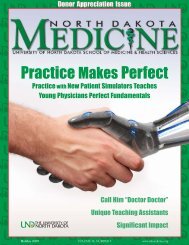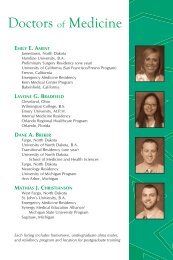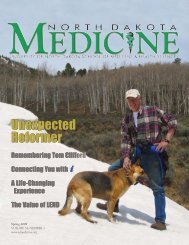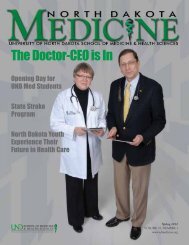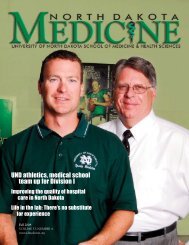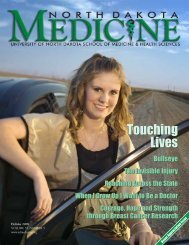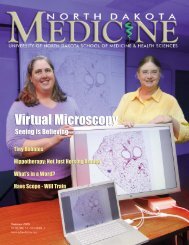Fall 2006 - North Dakota Medicine
Fall 2006 - North Dakota Medicine
Fall 2006 - North Dakota Medicine
- No tags were found...
Create successful ePaper yourself
Turn your PDF publications into a flip-book with our unique Google optimized e-Paper software.
I had acquired an interest inmedicine long before seminary.Visiting parishioners in the hospital keptit front-to-mind, said Carlson. Oftenthey were afraid to ask their doctorsquestions and many times the answerswere not clear. Id end up being thego-between at times.Carlson, a Bismarck, ND, native,graduated from Luther TheologicalSeminary in St. Paul, MN, in 1982 andwas ordained in the American LutheranChurch (now Evangelical LutheranChurch of America) that same year. Heserved parishioners in eastern <strong>North</strong><strong>Dakota</strong> for five years, helping many ofthem through tough times.I had training to help them only sofar in certain areas, he said, then Ihad to refer them to a mental healthprofessional.He began thinking about goingback to medical school and even begantaking the required classes in organicchemistry and biochemistry on theside. It was when tragedy hit that hereached the turning point in his life.When my daughter hadcardiomyopathy [a disease or disorderof the heart muscle] when she was justa baby, I spent even more time in thehospital, observing the health caresystem, said Carlson. Her deathpropelled me into looking seriously atmedical school.Not surprisingly, Carlson chosepsychiatry for his discipline. Currentlyhe practices at <strong>Dakota</strong> Clinic in Fargo,Solutions Behavioral Healthcare inMoorhead, and also serves as directorof medical student education inpsychiatry for the Department ofClinical Neuroscience and thepsychiatry clerkship director for theUND medical school. He hasntdeserted his past, however, as Dr.Carlson is still also Reverend Carlson.I never lost my interest intheology, he said. He still holds aposition with the synod office, helpingnew pastors transition into the ministryas well as helping pastors address issuesof conflict and pastoral care within theircongregational or chaplaincy settings.He feels his pastoral backgroundserves him well in his practice.I think I pay attention more closelyto the viewpoint and backgrounds ofpatients, he said. People all havetheir own stories in life, which areimportant to peoples current thinking,choices and needs.Challenges and BenefitsGetting into medical school is justthe first step for would-be doctors.Then you have to get throughmedical school.Some of our older students have ahard time adjusting to being studentsagain, said Richard Vari, Ph.D.,associate dean for medical educationfor the UND medical school. Medicalschool is hard, especially the first year.But once they get through that, theyknow if this is what they want to do.Willis agrees.I had my doubts when I firstmoved back to Grand Forks, she said.But after a year I knew this was what Iwanted to do.Many older students also havefamilies, which can be difficult tojuggle while in medical school.“I got into politics because Iwanted to change the world,but I wasn’t and I wantedsomething more fulfilling.”Karin Willis, M.D. ’05Karin Willis, M.D. ’05, became interested in medicine while providing governmentrelations and marketing services to military health care organizations in Washington, D.C.NORTH DAKOTA MEDICINE <strong>Fall</strong> <strong>2006</strong> 7



